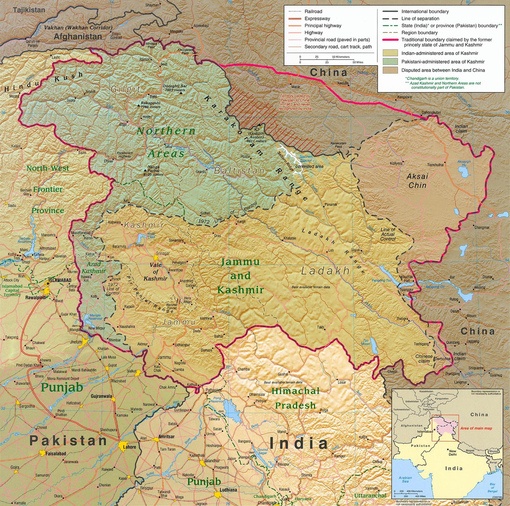
Map of Jammu and Kashmir – Public Domain
Amidst that pandemonium of 1947, Jammu and Kashmir was the first state in the newly freed Indian subcontinent to have its own written constitutional plan. The constitution guaranteed enfranchisement of all adult citizens, men and women, and took particular care to protect the dignity and religious freedoms of minorities. The admirable egalitarian and democratic quality of their achievement was partially a result of the political dissidence and collective consciousness that grew in retaliation to oppressive monarchical institutions, which had curbed their freedom for generations. The people of Kashmir were able to bridge religious and class divides to further the nationalist consciousness of a society in the process of self-determining.
A people newly emancipated from the clutches of an oppressive and rigorous monarchy blossomed. In that euphoric atmosphere, no force seemed powerful enough to militate against the dream of a democratic and emancipated society.
The armed conflict and counter insurgency in Kashmir changed political combinations and permutations without either disrupting political, social and gender hierarchies, or benefiting marginalized groups. The social, economic, political and psychological brunt of the armed conflict and counter insurgency has been borne by the populace of Kashmir since 1989. The uncertainty created by several decades has pervaded the social fabric in insidious ways, creating a whole generation of disaffected and disillusioned youth.
With the arbitrary revocation of the autonomous status of Jammu and Kashmir and its reduction to a union territory on August 5, 2019, lack of faith in the Indian polity has caused Kashmiris to cultivate an apathy to the electoral process, promised by Prime Minister Modi and his cohort. It is a given that persons best suited to carry out New Delhi’s agenda will be installed in positions of political import, regardless of public opinion.
With the detention of elected legislators, parliamentarians, and separatists, the earlier enthusiasm that accompanied electoral politics seems totally futile in the current political vacuum in the state.
Lack of accountability among the current J & K polity, Governor, and bureaucracy has caused a large number of people to toe the line by living with fundamental structural inequities and violence, instead of risking the ire of Prime Minister Modi and his totalitarian regime.
With the arbitrary arrest of grassroots workers of political organizations in the Valley, regional politics have been paralyzed and are in a moribund state. There seems to be an unbridgeable gulf between figures of authority like Home Minister Amit Shah, who claim that “the entire world had supported the move to abrogate the special status given to Jammu and Kashmir,” and the people of Kashmir, who have been deployed as pawns in the devious political game being played in our neck of the woods.
The glaring lack of civil liberties and closure of educational institutions in the Valley makes demoralization pervasive and underscores the redundancy of the educated segment of the population. The incarceration of several youths in Kashmir by Indian military and paramilitary forces is cruel, and has further alienated the disillusioned populace. The ruling Bharatiya Janata Party has legitimized the forces of masculinist nationalism and enabled virile hatred for the “other” to irreparably mutilate the fabric of Kashmir so systematically that the process of healing seems like a far cry as of now. Political opportunists and carpetbaggers have destroyed political autonomy and, in the aftermath, created institutional paralysis.
The political apathy, military high handedness, moral turpitude, and tattering of society in Kashmir is reflected in my conversations with family and friends. Most of those conversations are about a present blemished by the torrent of right-wing populism, lack of civil rights, and the nebulousness of an unforeseeable future.
Home Minister Amit Shah has been claiming with braggadocio that Jammu and Kashmir will become the most “developed region in the country” because of the revocation of its autonomous status. But, contrary to such tall claims, there will be no sustainable development until the institutional politics of governance is merged with the politics of mass mobilization to promote demilitarization and democracy.